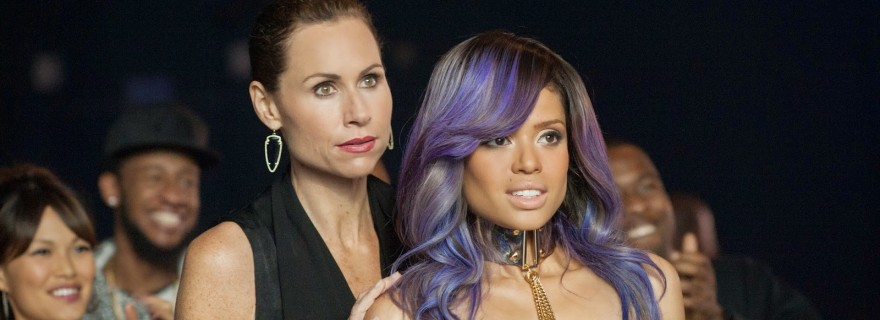'Beyond the Lights'
Movie Rating:
2
If nothing else, ‘Beyond the Lights’ succeeds in exploring a few important themes regarding how women are misused and abused by the entertainment industry. The movie deserves some attention for addressing these issues within an easy-to-swallow romance. Unfortunately, the romance itself is so dull and predictable that it’s hard to get behind the movie as a whole, despite the considerable promise shown in its early going. Sigh….
Gugu Mbatha-Raw stars as new flavor-of-the-month music starlet Noni. She dresses like a high class stripper and sings like an angel about the sorts of subjects that might appeal to low-rent strippers. After years working her way up through the industry, Noni is finally about to pop. Her scantily-clad bod is on the cover of countless magazines, she backed up the ridiculous white rapper Kid Culprit to a #1 hit, she’s the scandalous star of any awards show she’s invited to attend, and her debut album is just about to drop. So it comes as a shock when she tries to kill herself on the eve of her success. Luckily, a good and ridiculously handsome cop named Kaz (Nate Parker) was assigned to bodyguard her that night, and he saves her life.
Noni’s mother/manager/exploiter Macy Jean (Minne Driver) tries to write it all off as an accident and the press buys it, but Kaz knows better and Noni is grateful for someone who can see through all her packaged sexuality and confidence. Of course, they fall in love and wouldn’t ya know it, Kaz has a demanding and overprotective parent of his own (Danny Glover) who’s grooming him to be a politician. Geez, these kids sound like they’re made for each other, huh? Do you think true love can make them embrace their true selves? Hmmm… seems impossible, but who knows?!
Also, yes, of course that happens.
Writer/director Gina Prince-Bythewood (‘Love & Basketball’) deserves to be commended for at least touching on some of these issues so directly. We’re all so used to sexed-up music starlets being trotted out that their controversies barely register anymore. Miley Cyrus is the most recent example, with countless others before her. Sure, one could argue that a certain empowerment can be found in claiming and embracing celebrity sexualization, like Madonna did oh so many moons ago. Still, the truth is that it’s mostly mindless exploitation that everyone falls for because sex will always sell.
In Mbatha-Raw’s protagonist, Prince-Bythewood has created a tragic character to embody the sexploitation of the music industry. It’s an intriguing idea, but unfortunately, once the character and world are established, the problem is explained away as being the result of an overly controlling mother desperate for success at all costs, which needlessly simplifies the issue. Ditto Parker’s character, who represents pure living as a means toward professional gain rather than for the small satisfaction being a good person. There’s something compelling there, but again it eventually all boils down to dumb daddy issues.
When the intriguing themes that Prince-Bythewood introduces are essentially washed away in dated Freudian psychobabble, what do we have left? Well, just a cornball romance executed through the premise of ‘The Bodyguard’ and with the doe-eyed, soft-focus, Hallmark card clichés of Nicholas Sparks drivel. What a waste.
Some viewers might argue that Prince-Bythewood is smuggling her themes into the mainstream through safe romance genre tropes and deserves a pass, but I can’t drink that Kool-Aid. The trouble is that she’s starting with some interesting, prescient themes worth exploring and then piddles them all away into romantic fantasy just as divorced from reality as the stupidly sexualized imagery that the filmmaker satirizes elsewhere. When Noni finally embraces her true talents and natural hair in a YouTube video that goes viral, it’s just another modern ‘Cinderella’ fantasy. Likewise, Kaz seems to ditch his prescribed life in favor of merely playing another role as Noni’s endlessly supportive boyfriend without ever claiming an identity of his own.
‘Beyond the Lights’ opens with potent potential and then devolves quickly into Hollywood fantasy. You can’t really take it seriously as social commentary, and it’s certainly not close to a genuine representation of love. It’s ultimately an even more unattainable fantasy than the one the filmmaker opens her movie tearing down, and just as reductive. Sure, for this type of barrel-scraping romantic drama, the movie may be more compelling than the current Nicholas Sparks standard, but that’s more a reflection of how horribly off-course the genre has fallen than how superior this take on an old tale might be. ‘Beyond the Lights’ isn’t a terrible movie, but given all of the wasted potential involved, it can sure feel like one.




Josh Zyber
Byline has been corrected. Phil deserves proper credit for his work. Stupid mistake on my part. Mea culpa.